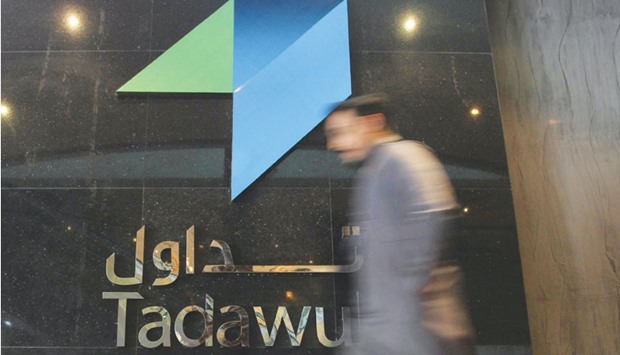Bourses in Saudi Arabia and Egypt recovered earlier losses and edged higher yesterday as crude prices bounced back, while other major Gulf stock markets slid.
Brent climbed 82 cents over $30 a barrel at 1218 GMT yesterday, lifted by hopes that Opec and non-Opec producers may be edging closer to a deal to tackle one of the biggest supply gluts in decades.
Traders and managers in the region believe that if Brent prices break below $30 - the new psychological barrier most investors are eyeing - then bourses will remain vulnerable to further declines.
The Saudi index reversed earlier declines in the final hour of trade, as crude prices bounced back over $30, closing at 5,637 points, or up 0.5%.
The petrochemical sector helped support the bourse higher, the sub-sector index traded up 0.6%, trimming its 2016 losses to 18.2%.
Petrochemical producer Saudi Basic Industries (Sabic), the largest stock by market value on the bourse, climbed 1.2%.
But low oil price is hitting consumer spending in the kingdom. Households’ disposable income is slowing, said Muhammad al-Agil, chairman of Jarir Marketing Co.
Jarir fell 2.4%. The electronics and stationery seller was the first Saudi retailer to report quarterly reports, and it posted a net profit flat to the previous year.
“We lowered our earnings estimates (for Jarir) for 2016 onwards based on decelerating growth in estimated consumer non essential spending,” said a note by Saudi’s Aljazira Capital. But they maintained a ‘buy’ recommendation on the stock because it is trading at an attractive valuation and dividend yield.
The retail sector edged up 0.3%, skimming its losses this year to 25.8%. The broader Saudi stock market has fallen 18.4% in 2016.
Othaim Markets proved to be the most resilient in that area and recorded 19% year-on-year growth in sales in the fourth quarter, said a note by Kuwait’s NBK Capital.
“We believe that Othaim’s focus on basic necessities makes it best positioned to withstand economic headwinds,” added the note. The stock gained 3.8%.
In the UAE, the Dubai exchange and Abu Dhabi’s index slipped 0.2 and 0.4% respectively, taking each of their 2016 losses to more than 11.0%.
Dubai Investments and Emaar Properties, two companies primarily engaged in real-estate development, fell 2.6% and 0.2% respectively.
Abu Dhabi’s Union National Bank tumbled 8.6%. The fifth largest lender in the emirate by assets on Monday posted a 55% drop in fourth-quarter net profit. The company also proposed a cash dividend of 0.20 dirhams per share for 2015, 20% lower than the cash payout the previous year.
Egypt’s main index edged up 0.1% to 5,897 points, 98 points off a session low. Both Egyptian and non-Egyptian Arab traders were net buyers of share, bourse data showed. Orascom Telecom, a stock favoured by both local and regional investors, traded up 1.8%.
Another telecom operator Global Telecom surged 7.10%. Trading patterns suggest that the spike in the stock’s price could be attributed to a single-ticket transaction.
Elsewhere in the Gulf, Oman’s index fell 0.6% to 4,934 points; Kuwait’s index slid 0.03% to 4,937 points, while Bahrain’s index added 0.5% to 1,156 points.

An investor walking past at the Saudi Stock Exchange (Tadawul) in Riyadh. The Saudi index yesterday reversed earlier declines in the final hour of trade, as crude prices bounced back over $30, closing at 5,637 points, or up 0.5%.
